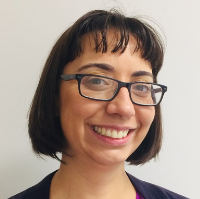Fabi Barticioti is a Digital Asset Manager at LSE Library. She recently attended the NEDCC Digital Directions Conference 2022 with support from the DPC’s Career Development Fund, which is funded by DPC Supporters.
I recently received a Career Development Fund grant from the DPC to attend the NEDCC 2022 Digital Directions conference, which was delivered entirely virtually. My initial interest in attending this conference was to expand my professional network, as I believed many of the attendees would likely be from organisations in the US. I was right about that; apart from me (based in London), another (in Edinburgh), and a handful of others scattered around the globe, most were from organizations based in the US.
For working parents, virtual events are more accessible as we can attend events within working hours as well as attend to daily childcare responsibilities. Not to mention that these online conferences are generally more affordable as our employers do not need to foot the bill for accommodation and travel. Conferences sessions are now being recorded and made available after the event closes, allowing us to watch them back or catch up with the missed parallel sessions.
The Northeast Document Conservation Centre (NEDCC) is an independent conservation laboratory specialized in treating and digitising collections. The Center offers conservation treatment, digital imaging, and audio preservation services, as well as preservation training, assessments and consultations, and disaster advice on collections. For more information and free resources, have a look at their website: https://www.nedcc.org/
Their conference programme had the overall goal to provide current, introductory, and essential information about digital collections care topics. They provided a well-planned programme of presentations delivered by enthusiastic and knowledgeable professionals. They covered digital preservation in a broad sense by including the common activities and themes we expect in a programme aiming at walkthrough the baseline activities of digital collections management. Some presentations covered similar knowledge ground and offered similar take-away resources as the Novice-to-Know-How online training offered by TNA and DPC.
Beyond the baseline, some presentations focused on other specific aspects of digital collections management including copyright, image capturing and managing digital collections for access. It is hard to pick one or two highlights in a blog post and be fair with all the presenters. My main take-aways were based in these sessions and were highly relevant for one of the aspects of my role at LSE Library which involves coordinating digitisation projects and making them available online.
One of the areas I am interested in developing further in my workplace is the idea that digitisation collections may require different levels of management and Terrance D'Ambrosio, Director of Imaging Services at NEDCC, covered this in his talk about Advanced Digital Imagine. The FADGI guideline is an excellent resource for those wanting to explore more on this idea. I intend to write a blog post about this body of work when I have more structured information to share with the DPC community, so watch this space!
Greg Cram, Associate General Counsel and Director of Information Policy at New York Public Library, managed to cover a lot of ground in his presentation Copyright: Understanding Rights & Responsibilities. He started describing the basics of copyright laws and their application in the GLAM sector and then covered various exceptions of the law that are relevant to the sector. He based his presentations in the US Copyright law, but the principles are very similar. His main message toward the end was, or at least my taking on his message, is that although copyright laws are complex and “scary” there are procedures we can put in place to mitigate risks. He certainly advocates for open access and for the sector to embrace taking risks with material In copyright and use diligence when assessing collections. For those not aware yet, there is the RightsStatements which can help organizations to communicate to users what and what not they can do with items available online. This certainly resonates with the LSE Library approach and revised guidance for re-using of images available in our Digital Library Terms and Conditions page. Greg’s presentation provided me with an opportunity to validate our approach to licencing digital objects and our continuous risk assessed approach.
I really liked some thoughts provided by Mike Thuman, Digital Transformation Advisor, Digital Enduro, LLC, in his presentation on Storage 101, particularly his views on cloud services. He compared some services provided by the giant companies out there and argued that, in his view, they are not appropriate to be used solely as digital preservation storage. I have been asked about these services by my community before and had not been able to give clear answers, but now I feel like I have a better understanding and will have an informed answer to give next time in the elevator pitch.
I really enjoyed attending the event as it gave me lots of opportunities to validate LSE Library’s management approach to digital collections. I also have a few take-aways I will be consulting with to develop further processes. I was not familiar with NEDCC work but will be following their news and resources with interest from now on. Thank you DPC for the opportunity to attend and expand my professional network!










































































































































